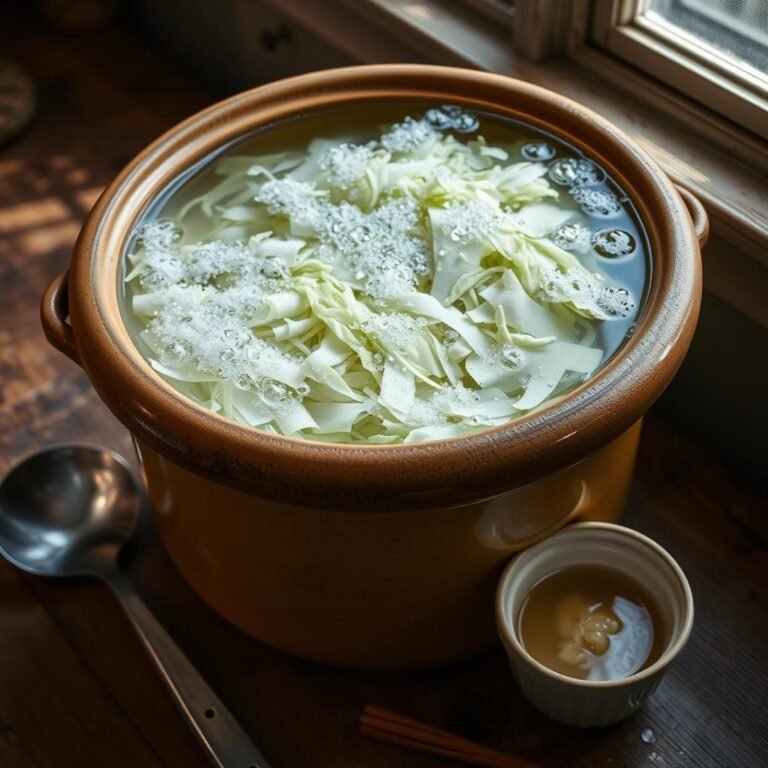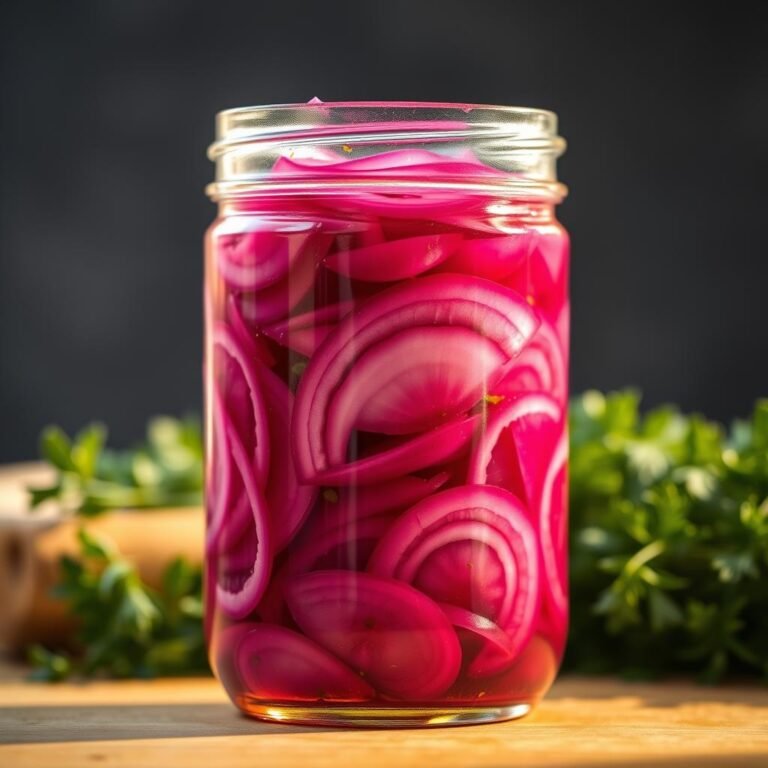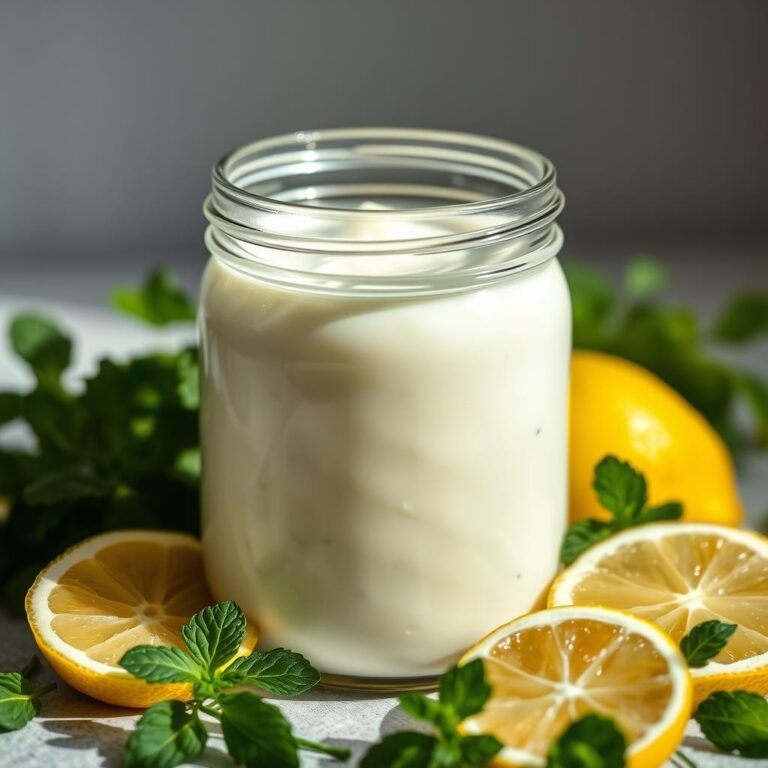Best Probiotics for Digestive Health: What to Eat Daily

Keeping your gut healthy is key to feeling good. Eating probiotics is a great way to do this. Probiotics are good bacteria that help keep your gut balanced.
Eating probiotic foods every day can make you feel better. Foods like yogurt, kefir, sauerkraut, kimchi, miso, and tempeh are full of good bacteria. They taste great and help your digestion.
Want to learn more about these healthy foods? Check out this guide.
If you can’t get enough probiotics from food, supplements can help. Eating probiotic foods regularly boosts your digestion and health.
Introduction to Probiotics and Their Benefits
Probiotics are called “good bacteria” and are key to our health. They live in our gut and help keep it healthy. Eating probiotics every day can make our digestion better and boost our immune system.
What Are Probiotics?
Probiotics are live microorganisms that help us when we eat them. They keep our gut’s bacteria in balance. Foods like yogurt, kefir, and fermented foods are full of them. Eating a mix of these foods is important for good digestion.
How Probiotics Improve Gut Health
Our gut needs the right balance of microbes to digest food well. Probiotics help by controlling bad microbes and growing good ones. Eating probiotic-rich foods like sauerkraut and kombucha helps our gut and boosts our mood and heart health.
Top Probiotic Foods for Gut Health
To keep your gut healthy, add probiotic foods to your meals. These foods have good bacteria that help digest food and prevent bad gut health. Here are some top picks:
Yogurt is full of probiotics like Lactobacillus and Bifidobacterium. Eating it often can really help your gut.
Kefir is a fermented milk drink with many probiotics. It’s known for its strong microbial benefits.
Sauerkraut comes from fermented cabbage. It’s rich in lactic acid bacteria. It’s a key food in many traditional diets.
Tempeh is a fermented soy product. It’s not only full of probiotics but also protein. It’s great for vegetarians and vegans.
Miso is a fermented soybean product from Japan. It’s full of bacteria that help digest food.
Kimchi is a spicy Korean dish. It’s packed with good bacteria. It’s known for boosting gut health.
Eating these probiotic foods daily can help your digestive system. It also improves your overall health.
The Role of Yogurt in Digestive Health
Yogurt is great for your digestive health because it has lots of probiotics. These good bacteria help your stomach work well. Eating yogurt often can keep your gut healthy and make you feel better.
Yogurt is also a natural way to get digestive enzymes and probiotics. It’s easy to add to your diet.
Benefits of Eating Probiotic Yogurt
Eating probiotic yogurt has many health benefits. It helps your bones, heart, and immune system. It can also fix problems like bloating and diarrhea.
Yogurt is a natural way to improve your gut health. Mayo Clinic says the live cultures in yogurt are key to these benefits.
Choosing the Right Type of Yogurt
When picking yogurt, choose low sugar and lots of live cultures. Yogurts with “live and active cultures” on the label are best. They help with digestion and have more nutrients.
Kefir: A Potent Probiotic Drink
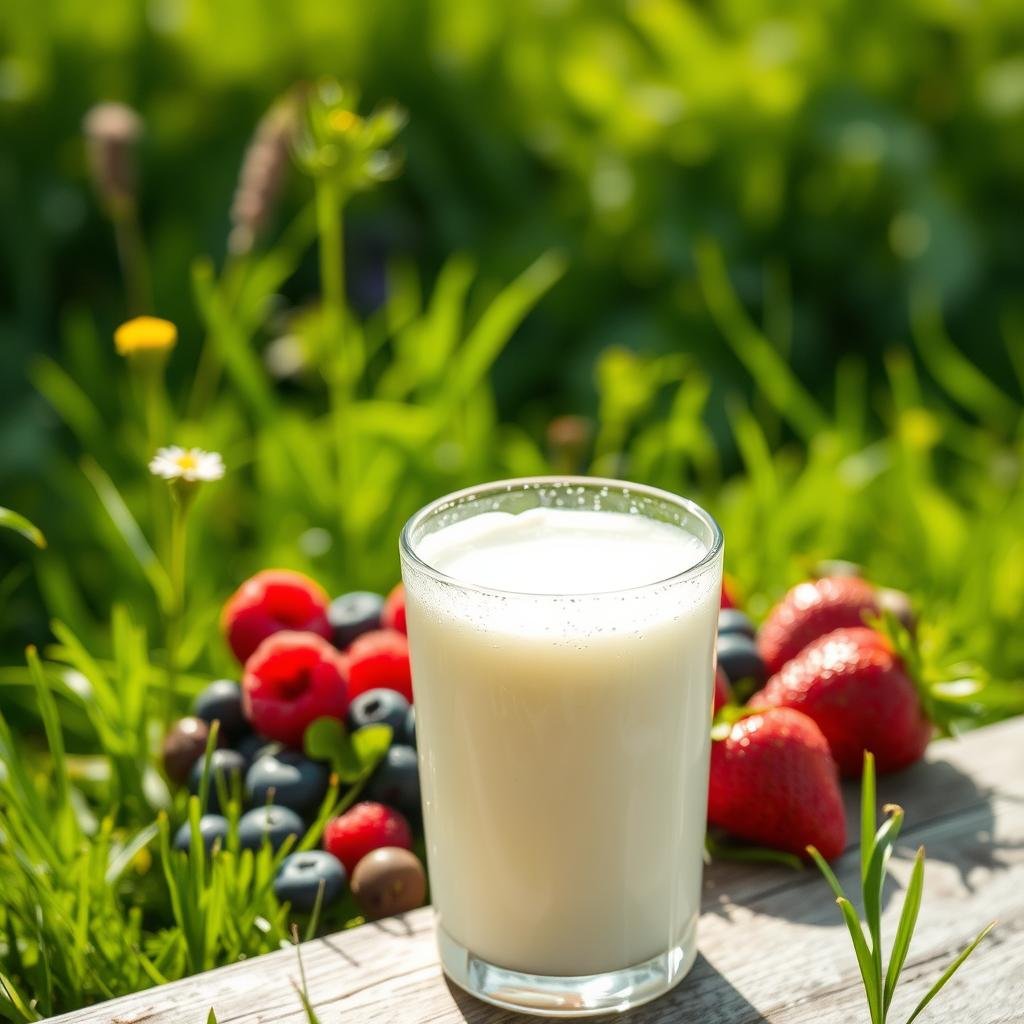
Kefir is a fermented milk drink that’s great for digestion. It has more probiotics than yogurt. One cup of low-fat kefir has lots of nutrients.
It has 9 grams of protein and 36% of calcium you need daily. It also has 20% of phosphorus and vitamins B12 and D.
Kefir has up to 61 strains of bacteria and yeasts. It fights off bad bacteria like Salmonella and E. coli. It’s good for your bones and can help with diarrhea and IBS.
Kefir is also good for people with lactose intolerance. The fermentation process makes it easier to digest. For more on kefir’s health benefits, check out this link.
Drinking kefir regularly boosts your probiotic intake. It’s full of nutrients and probiotics, making it great for your diet.
Fermented Vegetables: Sauerkraut and Kimchi
Fermented veggies like sauerkraut and kimchi are great for your gut. They are full of good bacteria and vitamins. These foods help keep you healthy.
Health Benefits of Sauerkraut
Sauerkraut is mostly cabbage that’s been fermented. It’s full of fiber, vitamin C, and vitamin K. This food is good for your gut because it helps grow good bacteria.
This helps you digest food better and absorb nutrients. Sauerkraut is also tasty and tangy.
Why Include Kimchi in Your Diet?
Kimchi is a spicy, tasty food from Korea. It’s full of probiotics that help your gut. The fermentation process adds good bacteria like Lactobacillus.
This helps with digestion and boosts your immune system. Kimchi also has lots of fiber and nutrients. These help keep your gut healthy.
- Rich in Probiotics: Helps maintain gut flora balance.
- High in Vitamins: Provides essential vitamins such as A, B, and C.
- Boosts Immunity: Fermented contents improve immune response.
Probiotics for Digestive Health
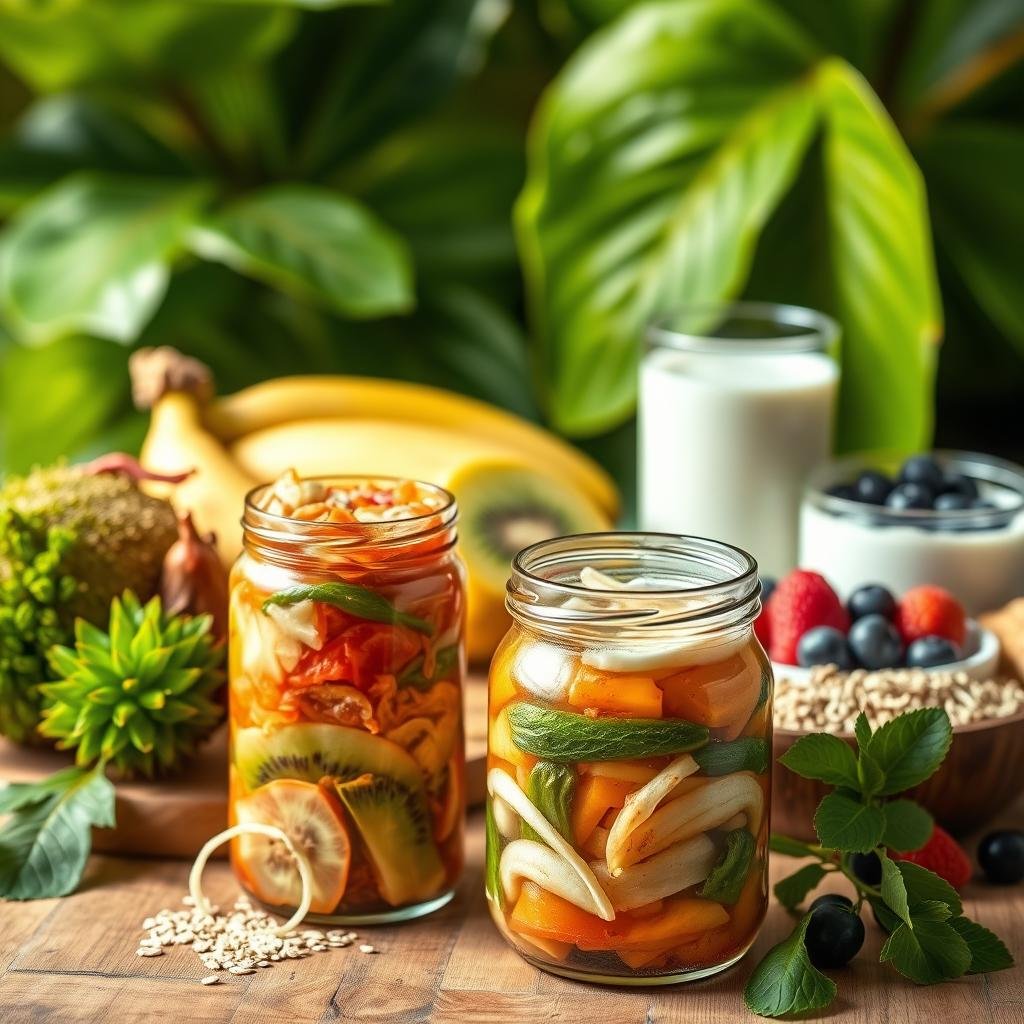
Probiotics and prebiotics are key for a healthy gut. They help balance the good bacteria in your stomach. This ensures you digest food well and absorb nutrients.
Eating foods rich in probiotics or taking supplements can help. For example, Culturelle® Digestive Daily Probiotic Capsules and Culturelle® Probiotic + Prebiotic Gummies can boost your gut health.
Choosing the right products is important. Some products mix digestive enzymes with probiotics. This mix can help your digestion even more.
Start by looking at different options like Culturelle® Metabolism + Weight Management with Slim. Make sure to pick high-quality supplements for your gut health.
Miso and Other Fermented Soy Products
Fermented soy products like miso and tempeh are great for your gut. Adding them to your meals can really help your digestion.
Nutritional Benefits of Miso
Miso is made from soybeans, salt, and koji. It’s full of probiotics and good for your stomach. It might even lower blood pressure and make your heart beat better.
It also helps control cholesterol and could lower cancer risk. For more on fermented foods, click here.
Tempeh: A High-Protein Probiotic Option
Tempeh is a soy product with lots of protein and probiotics. It’s also packed with vitamin B12, great for vegetarians. Eating 25 grams of soy protein from tempeh daily for six weeks can lower bad cholesterol by 3.2%.
It also lowers total cholesterol by 2.8%. Tempeh is good for your bones and heart. Its fiber helps with digestion too.
Probiotics through Fermented Beverages
Fermented drinks like kombucha are getting more popular. They are full of probiotics for your gut health. Drinking them can really help your overall health.
Kombucha: A Popular Fermented Tea
Kombucha is a fermented tea with good bacteria and yeast. It’s known for improving gut health. Drinking it often can lower the risk of diseases like diabetes and some cancers.
The health benefits of kombucha are many. It has antioxidants, helps with blood pressure, and fights inflammation. Adding kombucha to your diet can boost your gut health.
Research shows these drinks can be made with or without dairy. This makes them good for vegans and those who can’t digest lactose. So, everyone can enjoy the benefits of probiotics and prebiotics.
Importance of Including Probiotic Foods Daily
Eating probiotic foods every day is key for a healthy gut. It helps avoid dysbiosis, which is when the gut’s bacteria get out of balance. This imbalance can cause many digestive problems and affect how we feel overall.
Probiotics and Their Role in Preventing Dysbiosis
Probiotics are live good guys in our food. They help keep our gut’s bacteria in check. The right probiotics can make digestion better, boost our immune system, and even make us happier.
Daily Sources of Probiotics
To get enough probiotics, eat foods that are rich in them. Here are some great sources:
- Yogurt: It’s full of probiotics like Lactobacillus and Bifidobacterium.
- Kefir: This fermented milk drink has lots of different probiotics.
- Miso: A fermented soybean paste that adds good bacteria to soups and sauces.
- Sauerkraut: Fermented cabbage that’s full of probiotics and fiber.
- Kimchi: A spicy Korean dish made from fermented veggies, packed with probiotics and vitamins.
Eating these foods often helps keep your gut healthy. It’s a great way to get the most from the best probiotics for your gut.
Choosing the Best Probiotic Strains for Digestive Health

Choosing the right probiotic strains is key for good digestive health. Knowing about Lactobacillus and Bifidobacterium helps you make smart choices.
The Lactobacillus Genus
The Lactobacillus genus is well-studied. These probiotics are lactic acid bacteria that help balance the gut. They are found in foods like yogurt and sauerkraut.
Lactobacillus strains help break down lactose and make lactase. This enzyme is important for digestion. Adding Lactobacillus probiotics can help with digestion and improve gut health.
The Bifidobacterium Genus
Bifidobacterium is also important for gut health. These bacteria live in the colon and help break down fiber. They turn fiber into short-chain fatty acids.
This helps keep the gut lining strong and stops bad bacteria from growing. Studies show Bifidobacterium probiotics can reduce bloating and help with bowel movements. Eating foods like kefir and certain cheeses can help.
Supplementing with Probiotics: When and Why
Probiotic supplements are a handy way to boost gut health. They are great for people who don’t eat probiotic-rich foods often. They can help those with health issues or special diets by balancing gut bacteria.
When picking digestive enzymes and probiotics supplements, look for ones with live probiotics. Many things can kill probiotics, like how they’re made and stored. So, choose well-known brands that focus on quality to make sure they work.
People looking to improve digestion with probiotics should think about their health needs. Some probiotics help with irritable bowel syndrome or when taking antibiotics. Talking to a doctor can help find the right probiotic for your health goals.
